
Part of being a loving dog owner is ensuring that your pet's health is taken care of.
Just as it is important to recognize dog symptoms that may indicate a serious problem, there are also certain parts of your dog's body that require your care and attention to prevent something serious from occurring.
According to the American Veterinary Medical Foundation, "The old adage, 'an ounce of prevention is worth a pound of cure,' certainly holds true when it comes to pet health. The cost of prevention is often a fraction of the cost of treating a disease or problem once it has become more advanced."
Sure, preventative health measures are important. But how do I know which parts of my dog's body I should be paying attention to?
This exclusive list shows the 10 key areas of your dog's body to keep healthy. Focusing on care for these parts of the canine anatomy can help prevent a whole host of serious problems.
If you ever have major health concerns, you should take a trip to the vet right away. However, knowing this list of 10 dog areas to keep healthy can make a world of difference for your pet's long-term health.
Scroll through below to see what dog parts you should be paying attention to in order to keep them healthy and happy. This is some of the most important information I've seen in years!
This chart reveals the 10 different dog parts that you should always keep healthy. Scroll through to see exactly why each area is important, and what you can do to maintain it.
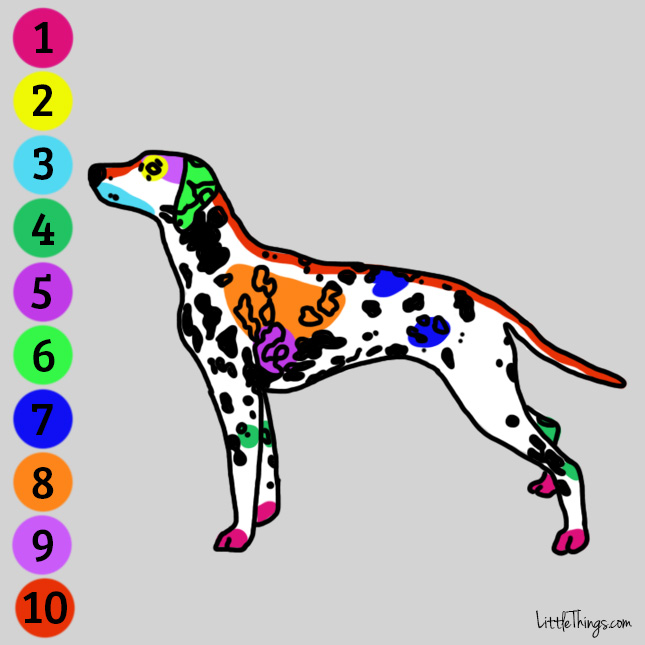
1. Paws
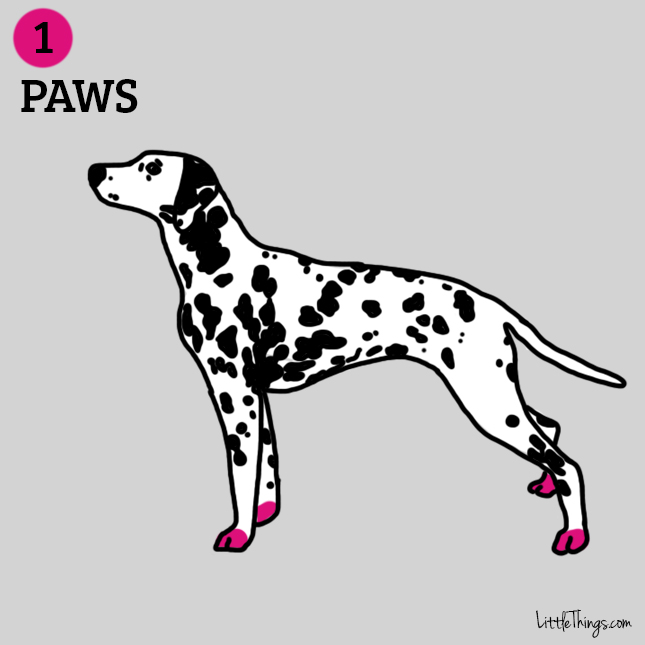
Possible paw problems:
- Cuts
- Long or broken nails
- Extreme dryness
- Inflammation of the toes, possibly due to allergies or parasites
- Blisters or ulcers, possibly due to burns or autoimmune disorders
- Poor circulation
How to keep the paws healthy:
- Keep nails neat and trimmed
- Massage
- Rub with moisturizer
- Wash with anti-fungal shampoo
- Apply antiseptic and soft pads to cuts
- Clean between toes
2. Eyes
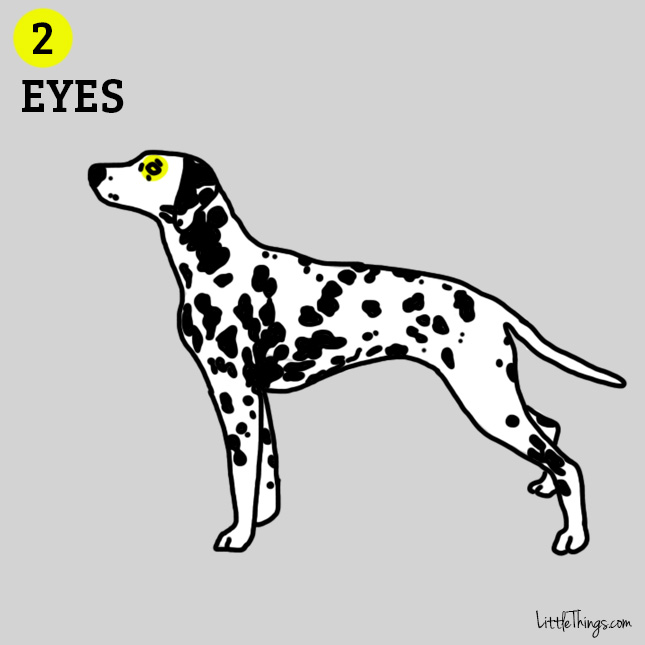
Possible eye problems:
- Infection
- Pink eye
- Corneal ulcers
- Irritation
- Cataracts or cloudiness
- Visible third eye lid
How to keep the eyes healthy:
- Gently wipe with a damp cotton ball
- Carefully trim hair around the eyes
- Add leafy green vegetables to the diet
- Use a tear-stain remover for cleaning stains around the eye
3. Mouth
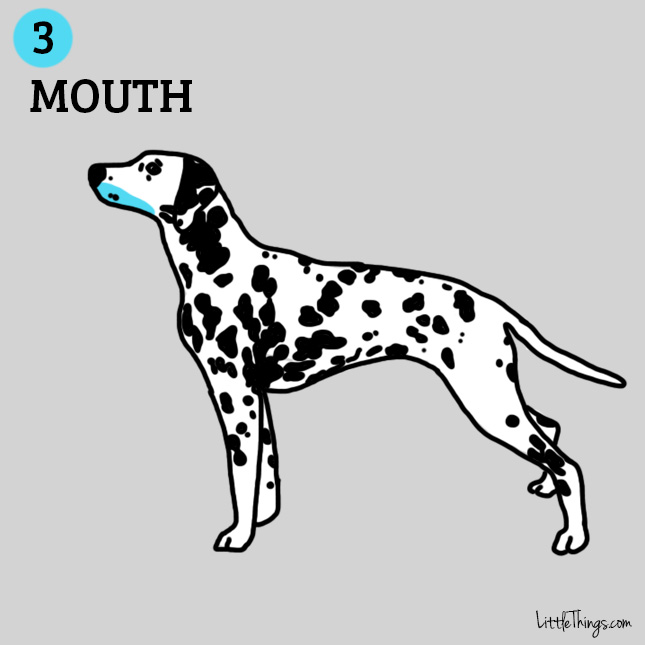
Possible mouth problems:
- Gingivitis
- Tooth decay
- Plaque buildup
- Bad breath
- Gum inflammation
How to keep the mouth healthy:
- Examine the gums and teeth for redness or swelling
- Brush teeth with toothbrush or soft gauze
- Give them chew toys to strengthen teeth
- Proper dental checkups
- Feed with dry food instead of soft food
4. Joints
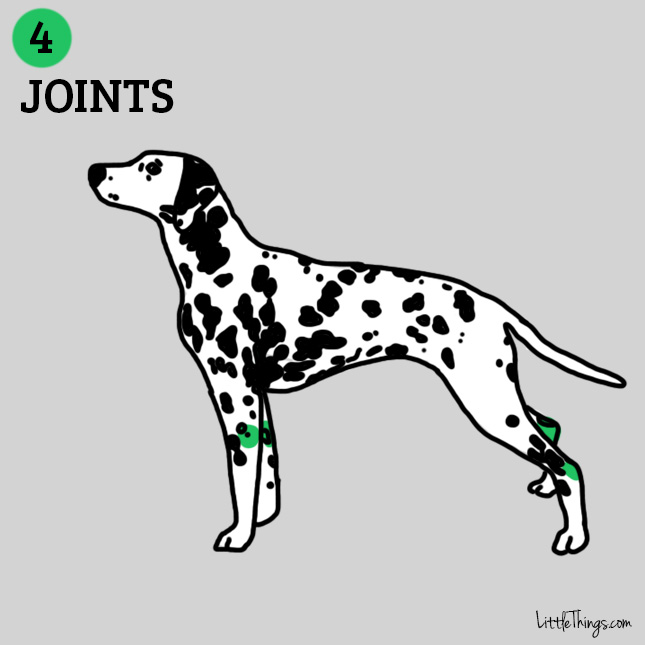
Possible joint problems:
- Swelling
- Hip dysplasia
- Arthritis
- Stiffness
- Infection
How to keep the joints healthy:
- Use pet stairs or ramps
- Weight management
- Put down carpets or rugs for a softer surface
- Keep them active
- Add fish oil as a dietary supplement
5. Heart
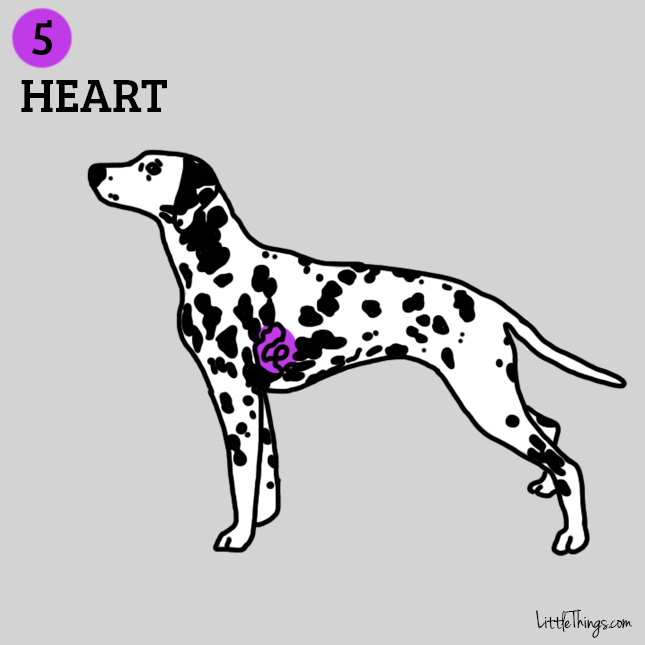
Possible heart problems:
- Congestive heart failure
- Heartworm disease
- Heart valve disease
- Heart murmurs
How to keep the heart healthy:
- Weight management
- Keep them active
- Add Omega 3 fatty acids as a dietary supplement
- Maintain a healthy diet
6. Ears
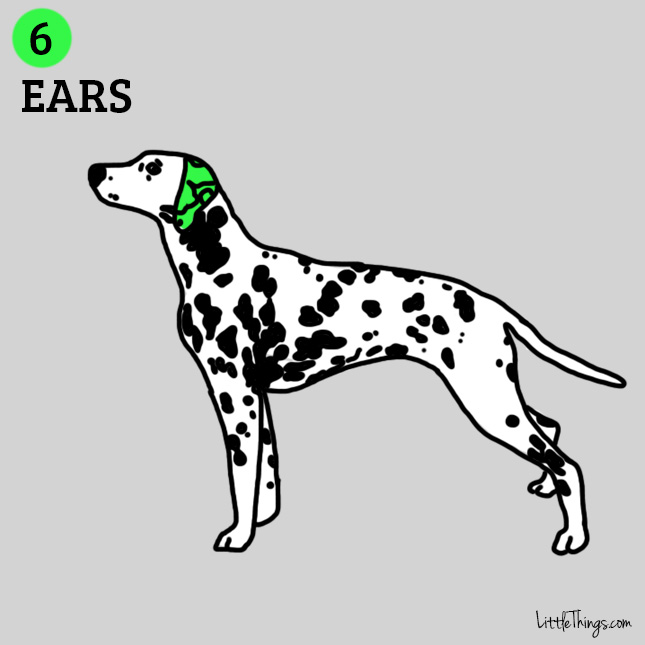
Possible ear problems:
- Infection
- Swelling
- Crusty skin
- Discharge
- Bad smell
- Hair loss
How to keep the ears healthy:
- Place cotton in ears before bathing
- Groom under ear flaps
- Clean ears with witch hazel, diluted tea tree oil, or hydrogen peroxide
- Avoid inserting anything in ear canal
7. Bladder and Kidneys
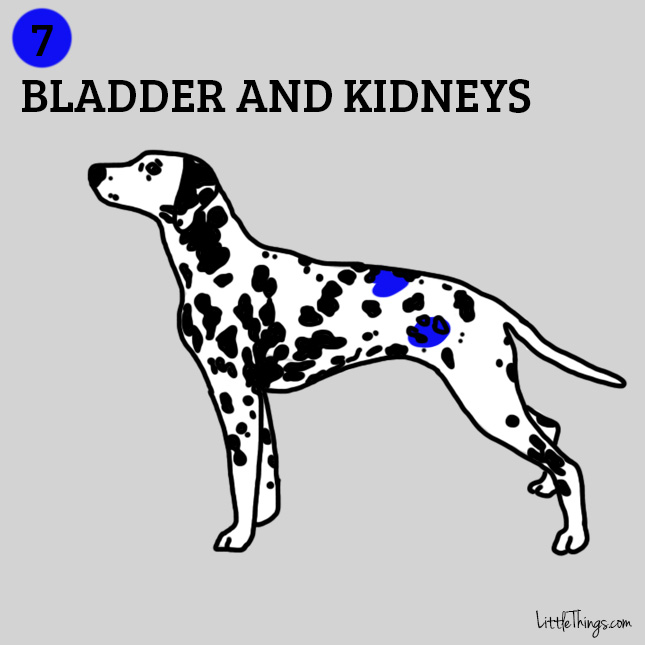
Possible bladder and kidney problems:
- Vomiting
- Blood in urine
- Kidney stones
- Bladder stones
- Mouth ulcers
- Weight loss, indicating possible infection
How to keep the bladder and kidneys healthy:
- Give them clean water
- Monitor urinary habits
- Ensure high fluid intake
- Add cranberries to diet to combat bad bacteria
8. Lungs
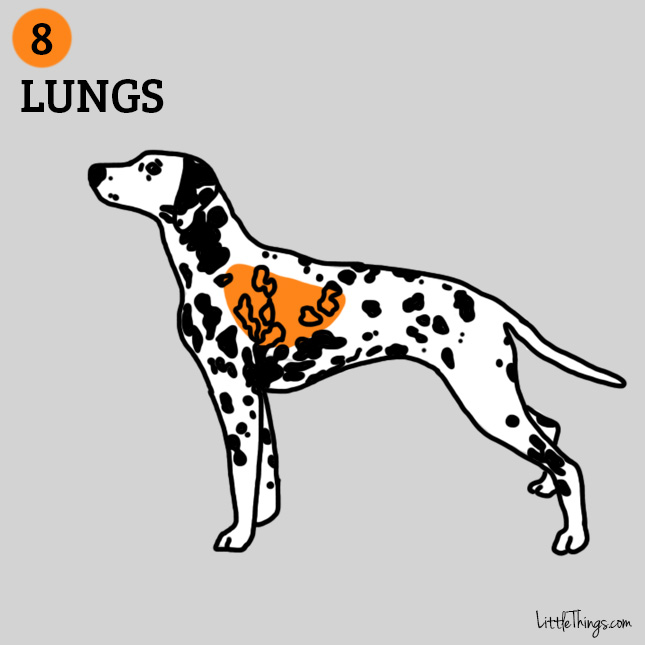
Possible lung problems:
- Choking
- Cough
- Bronchitis
- Infection
- Allergies
- Pneumonia
How to keep the lungs healthy:
- Ensure clear airway
- Ensure high water intake
- Limit exposure to extreme heat and humidity
- See vet for difficulty breathing
9. Brain
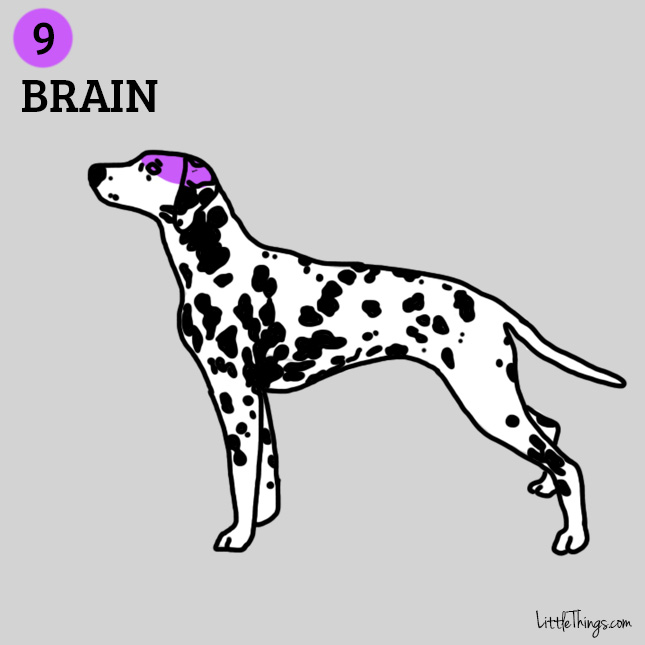
Possible brain problems:
- Confusion
- Tumors
- Memory loss
- Despondence
- Inability to learn
How to keep the brain healthy:
- Feed them foods rich in Vitamins C and E
- Constantly teach new tricks
- Play hide-and-go-seek with treats or favorite toys
- Practice activities involving eye-mouth coordination, like catch or fetch
- Provide stimulation with other people and dogs
10. Fur
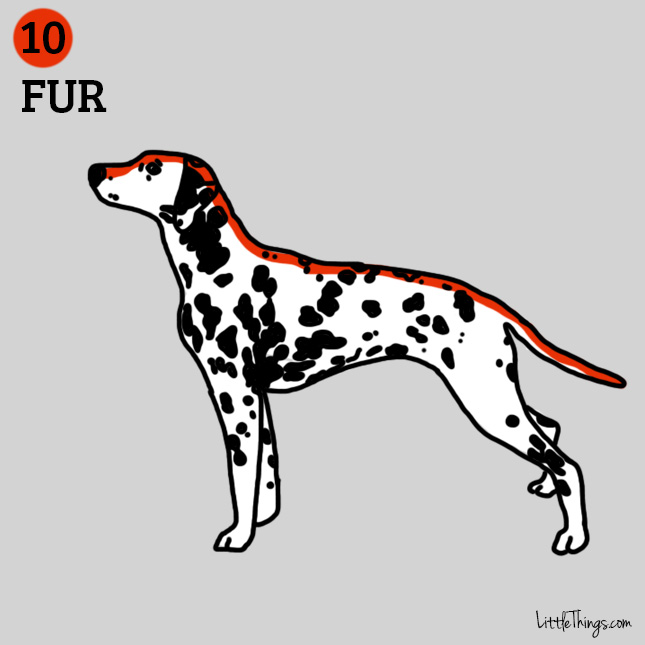
Possible fur problems:
- Allergies
- Yeast infection
- Mange
- Alopecia
- Fleas or ticks
- Ringworm
How to keep the fur healthy:
- Brush fur every other day
- Add vegetable oil to food
- Add Omega 3 fatty acids as a dietary supplement
- Bathe them
- Be careful not to over-bathe
Knowing which of your dog's body parts are important to pay attention to can be vital to their long-term health!
Please SHARE this vital information about your dog's health with friends and family!




